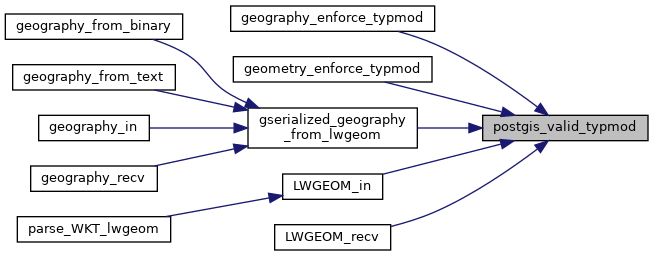Check the consistency of the metadata we want to enforce in the typmod: srid, type and dimensionality.
If things are inconsistent, shut down the query.
121 POSTGIS_DEBUG(2,
"Entered function");
124 if (typmod < 0)
return gser;
126 POSTGIS_DEBUGF(3,
"Got geom(type = %d, srid = %d, hasz = %d, hasm = %d)", geom_type, geom_srid, geom_z, geom_m);
127 POSTGIS_DEBUGF(3,
"Got typmod(type = %d, srid = %d, hasz = %d, hasm = %d)", typmod_type, typmod_srid, typmod_z, typmod_m);
151 if ( typmod_srid > 0 && geom_srid == 0 )
154 geom_srid = typmod_srid;
158 if ( typmod_srid > 0 && typmod_srid != geom_srid )
161 errcode(ERRCODE_INVALID_PARAMETER_VALUE),
162 errmsg(
"Geometry SRID (%d) does not match column SRID (%d)", geom_srid, typmod_srid) ));
173 geography_serialize(mgeom) :
174 geometry_serialize(mgeom);
183 if ( typmod_type > 0 &&
190 (typmod_type != geom_type)) )
193 errcode(ERRCODE_INVALID_PARAMETER_VALUE),
194 errmsg(
"Geometry type (%s) does not match column type (%s)",
lwtype_name(geom_type),
lwtype_name(typmod_type)) ));
198 if ( typmod_z && ! geom_z )
201 errcode(ERRCODE_INVALID_PARAMETER_VALUE),
202 errmsg(
"Column has Z dimension but geometry does not" )));
206 if ( geom_z && ! typmod_z )
209 errcode(ERRCODE_INVALID_PARAMETER_VALUE),
210 errmsg(
"Geometry has Z dimension but column does not" )));
214 if ( typmod_m && ! geom_m )
217 errcode(ERRCODE_INVALID_PARAMETER_VALUE),
218 errmsg(
"Column has M dimension but geometry does not" )));
222 if ( geom_m && ! typmod_m )
225 errcode(ERRCODE_INVALID_PARAMETER_VALUE),
226 errmsg(
"Geometry has M dimension but column does not" )));
int32_t gserialized_get_srid(const GSERIALIZED *g)
Extract the SRID from the serialized form (it is packed into three bytes so this is a handy function)...
int gserialized_is_geodetic(const GSERIALIZED *g)
Check if a GSERIALIZED is a geography.
int gserialized_has_m(const GSERIALIZED *g)
Check if a GSERIALIZED has an M ordinate.
LWGEOM * lwgeom_from_gserialized(const GSERIALIZED *g)
Allocate a new LWGEOM from a GSERIALIZED.
int gserialized_is_empty(const GSERIALIZED *g)
Check if a GSERIALIZED is empty without deserializing first.
void gserialized_set_srid(GSERIALIZED *g, int32_t srid)
Write the SRID into the serialized form (it is packed into three bytes so this is a handy function).
int gserialized_has_z(const GSERIALIZED *g)
Check if a GSERIALIZED has a Z ordinate.
uint32_t gserialized_get_type(const GSERIALIZED *g)
Extract the geometry type from the serialized form (it hides in the anonymous data area,...
LWPOINT * lwpoint_construct_empty(int32_t srid, char hasz, char hasm)
#define TYPMOD_GET_SRID(typmod)
Macros for manipulating the 'typemod' int.
void lwgeom_free(LWGEOM *geom)
LWGEOM * lwgeom_as_multi(const LWGEOM *lwgeom)
Create a new LWGEOM of the appropriate MULTI* type.
#define POINTTYPE
LWTYPE numbers, used internally by PostGIS.
#define TYPMOD_GET_M(typmod)
LWGEOM * lwpoint_as_lwgeom(const LWPOINT *obj)
uint8_t lwtype_multitype(uint8_t type)
const char * lwtype_name(uint8_t type)
Return the type name string associated with a type number (e.g.
#define TYPMOD_GET_TYPE(typmod)
#define TYPMOD_GET_Z(typmod)

